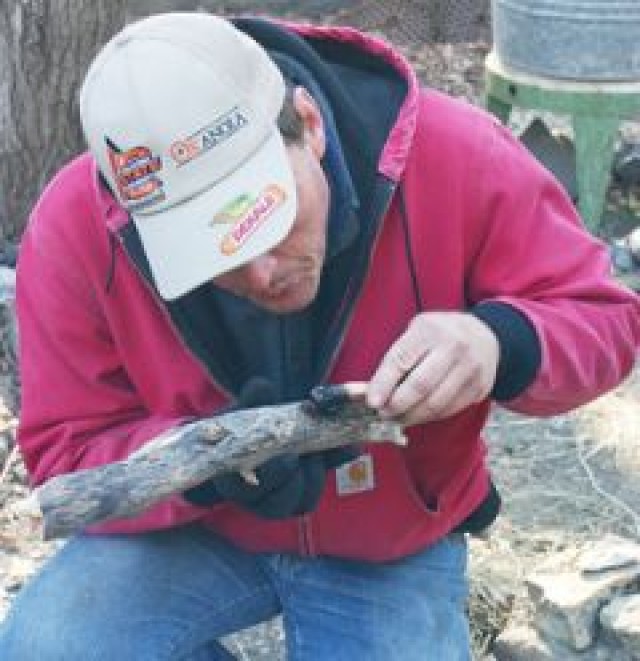FORT RILEY, Kan. - For hundreds of years sticks and stones have been used to survive, whether it was to prepare food for the Family or start a fire to cook the food. Today, not very many people can be seen using a piece of string and wood to make fire because they have other resources available to them. But what happens if these products or resources are taken away'
Learning how to survive off the land is exactly what John and Geri McPherson teach from their home, Prairie Wolf, near the small town of Randolph, Kan. They live in a log cabin on 46 acres of land.
Much of this land can be seen during the drive up their one-mile driveway, which can be easily missed by any person who is not paying attention. After going through the second gate, the cabin can be seen surrounded by trees, horses and different shelters and traps made strictly from the land.
A fire pit directly in front of the house is where most of the learning begins, because a fire is the key component to staying warm, cooking and surviving, John said.
John and Geri recently trained two survival instructors from the Survival Evasion Resistance Escape program at Fort Bragg, N.C. The two instructors learned everything from what to gather to start and keep a fire going to how to make footwear out of animal skin.
"I am far from being an expert on woodsman ship," John McPherson wrote in his book "Naked into the Wilderness. Primitive Wilderness Living and Survival Skills."
"I have taught myself what I need to know to go naked into the wilderness and, not only survive, but before long to be living fairly comfortably. I refer to my teachings as primitive living skills, not survival skills, though they can be used in that concept."
On Nov. 18, about halfway through the training of the SERE instructors, the day began with instructors gathering three sizes of kindling and tinder to start the fire. Kindling is a combination of sticks and twigs used to start and keep a fire going. Once all of the items were gathered, the men sorted out the kindling into piles to make it easier for them to start a fire.
Mike, who asked that his last name and rank not be used, is a SERE instructor. Using the bow method, Mike made a spark, called a coal. The bow method consists of using a bow to spin the drill back and forth in a piece of wood, also known as a fireboard. A coal is made by the motion of the drill on the fireboard. The coal will then be dropped into the bird nest of tinder. After Mike dropped the coal into the bird nest, he started blowing on it. The process produced a flame, and he then placed kindling on it, allowing the fire to grow.
Once the fire was built, the two instructors started working on flint tapping and telling stories about other things they learned throughout the time they had been with the McPhersons.
Both John and Benny, the other SERE instructor from Fort Bragg, talked about a deer they were able to obtain because it had been hit by a vehicle. They used the tools they had made, by hitting two pieces flint together, to skin and cut the meat from the animal. They also learned how to make tools from the animal including footwear out of the fur and a sack to carry water.
Benny demonstrated how he was able to break the flint to make tools, similar to the ones used to make the footwear and sack from the deer. While he demonstrated where to hit the flint correctly to make a sharp edge, he talked about the first time he started to strike flint, or flint tap. He would just hit two rocks together not knowing what he was doing, Benny said. Holding out a small tool made out flint, he said he now knows the correct way to flint tap.
When it was time for lunch, everyone picked out their Meals Ready to Eat and sat around the fire to enjoy stories from each other. The McPherson's dog, Gypsy, sat next to John because he fed her cheese and bread while everyone waited for their MRE to heat up.
John began practicing primitive skills in 1973 after reading "Outdoor Survival Skills" by Larry Dean Olson. Geri has been doing homesteading skills since the late 1960's. Any person who would like to learn primitive skills from the McPhersons much first show they are serious about learning the skill. The couple used to teach civilians all the time but stopped due to the lack of seriousness, John said. John and Geri still teach those who ask for their help, including Special Forces, Rangers and American Indians.
According to the Prairie Wolf Web site, they "have always been quick to oblige helping (Military Special Operations Community) in any way that we could. Primitive survival is taken very seriously by them."
Visit their website at www.prairiewolf.net to learn more about Prairie Wolf or to contact the McPhersons.


Social Sharing